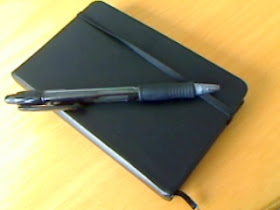I have been too easily distracted lately. To deal with this problem, I have bought myself a notebook. My attempts to use a notebook in the past failed, and I think this is because I overemphasized its aesthetic elements. This morning I want to distinguish between the unavoidable aesthetic of a notebook and the discipline a notebook should also stand for.

"A notebook," said Jørgen Leth, "is an improvement on the art of living." This is a telling way of putting it. On his new album, he explains that his notebook compensates for an unreliable memory. If he doesn't write them down, his ideas are lost forever.
But there is more. "The notes become interesting in themselves," he says; the notebook comes to serve his writing "as a form". "It becomes an aesthetic strategy," he tells us, that makes use of "the looseness of the notes". Ideally, he will reread something he has written in his notebook and exclaim, "But this is a great text, damn it! It's a text." Sometimes, in fact, "the poem ... can be lifted directly from the notebook".
"I like that discipline," says Leth. But is what he describes really discipline? As he says, it is an approach to the notebook as an aesthetic, as an autonomous literary form. It is not an aid to a better life but "an improvement on the art of living" itself. The notebook becomes "a text". An end in itself, not a means to one.
I want to explore the alternative in the weeks to come. Treating a notebook as a discipline means using it only as a means to a greater end. The loose notes are written down so that the ideas that inspired them can rest, secure in the knowledge that they will be given a chance to express themselves in an upcoming writing session. The painter Michael Andrews put it like this:
Making notes was a way of forestalling deliberations about distractions which presented themselves as substitute responsibility for what I was doing (for which I really felt responsibility). ... If I had not made notes of them they would have stuck in my mind and would have compelled an interminable familiarisation and analysis and I should have lost my presence of mind in a preoccupation. ("Notes and Preoccupations", X 1, no. 2, 1960, p. 137)
So one should have (as ever) a regularly scheduled working practice (a writing schedule) in which to develop one's ideas in prose (on the one hand) and a notebook (in the other) in which to merely jot stray thoughts down. Those jottings should only contain enough detail to appease the idea that presents itself as a distraction, as substitute responsibility. My hope is that, with training, it will be a simple matter of writing the notes until my "presence of mind" returns.
As with any other discipline, your mind and body need to learn to trust your routine. So, if you write things down in your notebook but never return to your notes to develop the ideas you have noted down there, your creative self (mind) will not regain its "presence" by the act of making the jottings. It will not trust the operation. Perhaps that is the "discipline" Leth has perfected; he is able to note down very precisely the ideas his distractions indicate—in a sense, perfectly. Perhaps he has found the perfect unity of inspiration and distraction.
Lovely post. Thanks for that, Thomas.
ReplyDelete(I also bought myself a new notebook today, although it is of the A4 spiral-bound variety. Nice and big.)
Glad you liked it. I'll have to return to this theme as we near the end of the semester. See if it worked.
ReplyDeleteIt's funny, I just bought a cheap steno notebook for a specific project: a single 20 page article. Everthing I write down away from my computer will go there. And nothing extraneous to that project will go there. I will see if that works out.
ReplyDeleteI wonder if it's incidental that you should use the concept of distraction in relation to notebooks...
ReplyDelete"Distraction" is actually etymologically related to notebooks - or rather to "tract", originally meaning "little book".
And it's also like that in German, where you can say "Verzettelt" for "Distraction", related to "Zettel", a note. The German makes an almost poetic point here:
When you are distracted, you are, so to speak, torn into notes.
I didn't know that. Interesting. But my dictionary doesn't support your etymology. It gives me "dis-strahere", i.e., "to draw [trahere] away [dis]". Tract (tractatus) is also related to trahere, but my dictionary is not quite clear how.
ReplyDeleteI don't know about the German.
I must admit that my sources on that piece of etymological knowlegde are rather secondary; and a quick search on Google seems to confirm that "tract" and "distraction" are etymological siblings of "trahere" rather than father and son... as you imply.
ReplyDelete